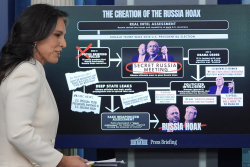South Korea’s new president, Lee Jae-myung, is a pragmatic outsider whose “Korea First” approach could strain ties with Trump, especially over AI, North Korea, and potential nuclearization.
After the impeachment of President Yoon Suk-yeol and three months of political uncertainty, South Koreans elected Lee Jae-myung from the progressive opposition party as their new president on June 3.
Lee, a political outsider and pragmatist, will likely pose several challenges for President Donald Trump.
President Lee’s Relationship with the United States
First, Lee is a political outsider who has built his career in local government. He seeks to leverage his non-elite background as a new form of political legitimacy, positioning himself as a candidate who thinks outside the box. He does not adhere blindly to the norms and rules of the established order, especially when his vision for rebuilding the country conflicts with them.
Suppose Trump attempts to use America’s hegemonic power to pressure Lee on issues related to North Korea and China. In that case, it is unlikely that Lee will acquiesce, as he generally resists the established global hierarchy. A better strategy for Trump may be to persuade Lee to oppose these two hostile countries by providing a solid political and economic rationale.
To effectively persuade Lee, Trump should invite him for a state visit as soon as possible. This would serve as a chance to advance America’s national interests and promote cooperation in various areas. However, the most critical aspect of this engagement should be to show respect for Lee and acknowledge the importance of the political and economic relationship between the two allies.
Political outsiders like Lee are more likely to support America’s leadership when they feel respected. Ironically, even though these outsiders may challenge the established order, they tend to appreciate it when that order acknowledges their values and interests. The crucial point is to avoid coercive strategies, such as imposing high tariffs or economic sanctions, as these could create unintended negative consequences.
Second, Lee’s catchphrase is, “I will follow through with my promises at all costs.” This motto was prominent during his presidential campaign three years ago and remains central to his approach today.
Lee’s primary campaign promise is transforming South Korea into “a world-leading economic powerhouse.” He pledged to build an AI data center to achieve this goal and provide all citizens free access to ChatGPT. As of September 19, 2024, South Korea ranks as the sixth-largest nation in AI competitiveness.
Lee and Trump Might Clash Over AI
As Lee works to enhance the country’s AI capabilities, he may encounter opposition from Trump, who seeks to maintain American leadership in AI and aims to increase the nation’s competitiveness.
Last January, he announced the Stargate Project, a significant joint venture with a remarkable investment of $500 billion dedicated to developing US AI infrastructure. Leading technology companies support this initiative, including OpenAI, Oracle, Japan’s SoftBank, and the Emirati sovereign wealth fund, and MGX.
The Stargate Project reflects Trump’s policy perspective of a zero-sum game. Since South Korea is not part of this global AI partnership, Trump may view any advancements in South Korea’s AI capabilities as a loss for America. This perception could lead to unnecessary conflict between Trump and Lee.
Instead, Trump should consider leveraging South Korea’s strengths in AI to benefit the United States. With South Korea excelling in areas such as AI infrastructure, development, government strategy, and scalability, Trump could shift his zero-sum mindset to a positive-sum perspective that increases overall value, allowing both the US and South Korea to prosper.
Third, when Lee seeks to solve problems, he adopts a pragmatic approach. He often emphasizes that “it doesn’t matter if a cat is black or white, as long as it catches mice, it’s a good cat.” This phrase, attributed to Deng Xiaoping, the former paramount leader of China, highlights Lee’s focus on policy outcomes rather than strict adherence to ideological principles in his reform initiatives.
What Is Lee’s Plan for South Korean Prosperity?
To transform South Korea into “a world-leading economic powerhouse,” Lee will likely first negotiate with Trump, given that the US has been South Korea’s most reliable security and economic ally for nearly a century. However, if he faces challenges during these negotiations, Lee will not hesitate to turn to China, South Korea’s largest trading partner, even though this goes against Trump’s wishes.
Lee understands that political stability and peace on the Korean Peninsula are essential for South Korea to become a leading economic power. To achieve this, he is likely to engage in dialogue with Kim Jong-un, the supreme leader of North Korea.
Since 2023, Kim has completely severed ties with South Korea due to the hardline policies implemented by former President Yoon Suk-yeol.
As a goodwill gesture, Lee may propose reopening the Kaesong Industrial Zone (KIZ). This special administrative region operated from 2002 to 2016 and is six miles north of the Korean Demilitarized Zone. The KIZ allowed South Korean companies to manufacture goods using North Korean labor while paying North Koreans wages in US dollars. This Zone once symbolized reconciliation and peace between the two Koreas.
Lee may seek Trump’s approval to reopen the KIZ to promote economic cooperation and mutual peace. If Trump opposes this initiative, Lee is unlikely to give up easily. Instead, he may explore alternative strategies to stabilize the region and foster peace, which could potentially include developing a secret nuclear weapons program.
If Lee believes he cannot achieve meaningful political or economic progress because of Trump’s objections, he will likely consider adopting Deng Xiaoping’s “cat theory.” This approach could lead him to explore nuclear options as an alternative means of ensuring mutual peace, helping to counterbalance the security threats posed by North Korea.
Lee’s Stances on South Korean Nuclearization
Lee is aware that since Trump’s inauguration, Korea’s public interest in independent nuclear armament has grown. Notably, 76.2 percent of South Koreans support the idea of their country pursuing atomic weapons if Trump were to recognize North Korea as a nuclear power, either implicitly or explicitly.
Lee will find it difficult to disregard indigenous nuclear armament amid Trump’s increasing bromance with Kim Jong-un and the growing dissatisfaction among his people regarding America’s nuclear umbrella. Meanwhile, this challenge presents the left-leaning President with an opportunity to gain influence among conservatives, the primary supporters of the pro-nuclearization movement.
By pursuing nuclear capabilities, Lee will likely leverage the challenge to broaden his political base and stay longer in office.
Fortunately, as of now, Lee does not favor nuclearization, as he believes the Korean Peninsula should remain free of nuclear weapons and the associated risks. However, Trump’s missteps could prompt Lee to reconsider this stance.
In summary, unlike his predecessor, Yoon Suk-yeol, Lee is less likely to align his actions with Trump’s directives. He is expected to promote a “Korea First” policy, similar to Trump’s “America First” policy.
As a result, the two leaders may find themselves at odds if Trump’s foreign policy constantly prioritizes the stick over the carrot.
About the Author: Seung-whan Choi
Seung-whan Choi teaches Korean politics and International Relations at the University of Illinois at Chicago. A retired Army officer, he has authored four books and 62 journal articles. His work has also appeared in popular media such as the Chicago Tribune, The Hill, The National Interest, and The Diplomat.
Image Credit: Shutterstock/Yeongsik Im.














